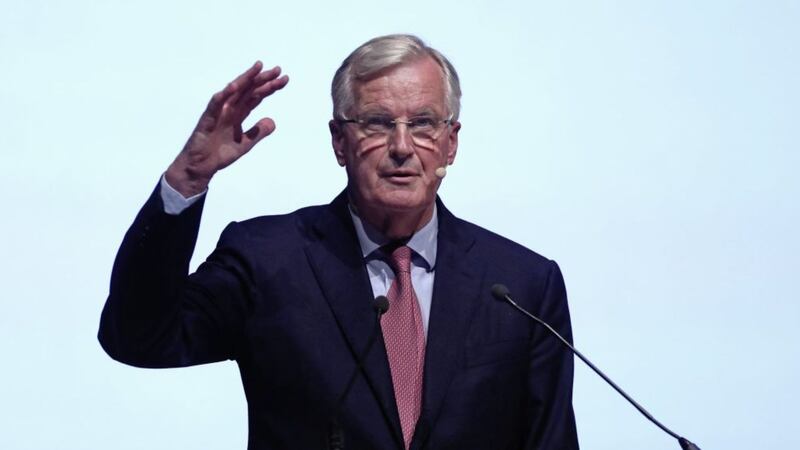A DEAL on the Irish border to break the Brexit deadlock is not close, the EU's chief negotiator has said.
Michel Barnier was speaking as British prime minister Theresa May briefed the Cabinet on her plans to achieve a breakthrough in time to secure a special Brexit summit to seal an agreement in November.
Mrs May is pursuing a possible "review mechanism" to be included in any withdrawal agreement, which would enable the UK to bring its participation in a customs union with the EU to a close.
Reports over the weekend suggested that a withdrawal deal may be imminent, as technical talks continue in Brussels.
But Mr Barnier told Belgian broadcaster RTBF: "For now, we are still negotiating and I am not, as I am speaking to you this morning, able to tell you that we are close to reaching an agreement, since there is still a real point of divergence on the way of guaranteeing peace in Ireland, that there are no borders in Ireland, while protecting the integrity of the single market."
Taoiseach Leo Varadkar told Mrs May on Monday that he was ready to consider a review mechanism as part of a "backstop" arrangement to keep the border with Northern Ireland open after Brexit.
But he made clear he would not accept an arrangement which gave the UK unilateral powers to ditch the customs union without the agreement of Brussels.
Mrs May is understood to view the mechanism as a means of allaying the concerns of DUP and Conservative MPs who want guarantees that any future membership of a customs union is temporary.
DUP MP Sir Jeffrey Donaldson said Dublin's stance was making a no-deal Brexit likely.
"Looks like we're heading for no deal," he tweeted.
"Such an outcome will have serious consequences for economy of Irish Republic. In addition, UK won't have to pay a penny more to EU, which means big increase for Dublin. Can't understand why Irish government seems so intent on this course."
The tough talk from the Republic came as shadow chancellor John McDonnell confirmed Labour would not support a temporary customs union with the EU.
Asked if Labour would vote against a customs union option unless it was permanent, he told BBC2's Newsnight: "Yeah, I think so, because... we'll see what she comes back with and we will be straight and honest with people – if it doesn't protect jobs and the economy we can't support it.
"All the messages that we get back over this whole period is that our European partners desperately want what we want – a deal that will protect their jobs and their economies in the same way that we want to.
"So, we think there's a deal to be had if they recognise that the deal is unacceptable to parliament, I think that opens up a vista of the opportunity of the real negotiations."
Justice secretary David Gauke warned that a no-deal Brexit would be bad for the UK.
Mr Gauke told a Channel 4 debate show: "If we leave on no-deal terms, there's no good shying away – it will be very bad for us economically.
"If we can get a good deal, and that means removing all the frictions... the Chequers-type deal, as I say, if we don't have friction with trade, then, economically, I don't think it's going to make a particular big difference one way or the other."
Amid reports that Brexit secretary Dominic Raab and other Cabinet Brexiteers were pushing for the UK to be able to quit any backstop with a few months' notice, there was brighter news for Mrs May as it was reported the EU was prepared to offer London a compromise on the Irish border issue.
Brussels may put forward an "independent mechanism" by which Britain could end a temporary customs arrangement with the EU, according to The Times.
The backstop issue has become the major obstacle to agreement on the UK's withdrawal from the EU, due to take place on March 29 2019.
Meanwhile, a Survation poll of 20,000 people for Channel 4 estimated Remain would win another in/out referendum by 54% to 46%.








